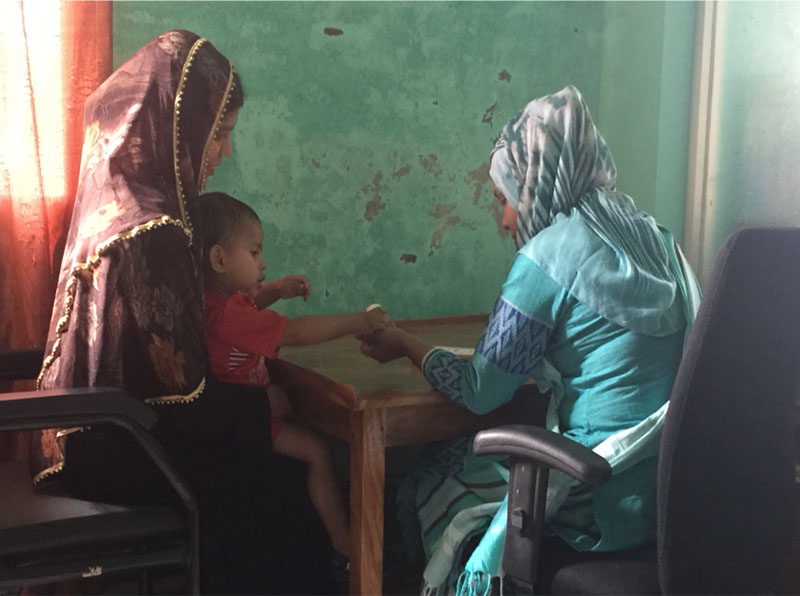 Every year, 200 million children under 5 years of age fail to reach their full cognitive development, the vast majority of cases in low-income countries. Ten percent of the global burden of disability results from neurodevelopmental impairment arising from perinatal conditions. Maternal undernutrition and infections are two prevalent and modifiable pregnancy risks linked with adverse neurodevelopmental outcomes.
Every year, 200 million children under 5 years of age fail to reach their full cognitive development, the vast majority of cases in low-income countries. Ten percent of the global burden of disability results from neurodevelopmental impairment arising from perinatal conditions. Maternal undernutrition and infections are two prevalent and modifiable pregnancy risks linked with adverse neurodevelopmental outcomes.
Our research in Bangladesh is conducted in collaboration with the Projahnmo Research Group—Projahnmo, meaning “generation” in Bangla—a multi-institutional partnership between Johns Hopkins University, the Bangladesh Ministry of Health and Family Welfare, Brigham and Women’s Hospital, icddr,b, Shimantik, and the Child Health Research Foundation. In a prospective cohort of ~300 mother-infant dyads in rural Sylhet, we examined how maternal undernutrition and infections during pregnancy influence fetal inflammation (Lee et al., Nutrients, 2021) and early brain development (Lee et al., Pediatr Res., 2024). One-third of mothers were underweight (BMI <18.5), and low prenatal intakes of B vitamins, vitamins D and E, iron, zinc, and linoleic acid were significantly associated with elevated cord blood cytokines at birth, especially IL-8, a marker of systemic inflammation. We also observed trends linking antenatal and intrapartum infections with elevated inflammatory markers in cord blood. We followed children for 24 months and found that elevated C-reactive protein (CRP) and IL-6 levels at birth were associated with fine motor delays at 2 years, while elevated CRP predicted lower receptive language scores. Among small-for-gestational-age (SGA) infants, inflammatory markers were more strongly associated with developmental delays across multiple domains—including cognition, motor skills, and language—highlighting the heightened vulnerability of growth-restricted newborns.
These findings support the neurobiological role of perinatal inflammation in early brain development and underscore the importance of maternal micronutrient intake and infection prevention in pregnancy. This research laid the foundation for prenatal interventions to reduce fetal inflammation and improve neurodevelopmental outcomes in low-resource settings, inspiring the ENAT study in Ethiopia.
Project for Advancing the Health of Newborns and Mothers - Breastmilk Studies
South Asia has the world’s highest rates of exclusive breastfeeding up to six months of age, yet there is limited data on human milk composition in Bangladesh, where 1 in 5 females of reproductive age are underweight [BMI (in kg/m2) < 18.5], and 30% of infants are born small for gestational age (birthweight less than 10th percentile).
Our current research focuses on a lactation cohort nested within the Projahnmo pregnancy-birth cohort. Participants were consecutively recruited during their first postpartum visit, and breastmilk samples were collected around one and five months postpartum. Babies’ were followed up until 36 months postpartum, allowing our team to investigate trends in milk nutrient concentrations in the Bangladeshi population and identify predictors of poor growth and neurodevelopment.
A recent publication by our team (North et al., J Nutrition, 2024) explored maternal and infant predictors of human milk macronutrient and energy concentrations in this cohort up to 6 months postpartum. Our findings showed a decline in the protein, fat, and energy concentrations of milk samples from one to five months. Other ongoing studies are assessing the concentrations of other components of breastmilk in our cohort, such as lactoferrin, fatty acids, and growth factors (leptin and insulin growth factor [IGF-1]), which are hypothesized to protect the developing brain from injury and encourage growth and development during infancy.